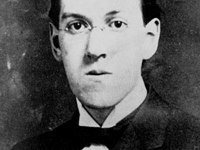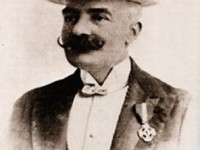
Douglas Adams (1952 – 2001), photo:
Michael Hughes, CC BY-SA 2.0, via Wikimedia Commons
On May 11, 2001, writer, dramatist, and musician Douglas Noel Adams has passed away. His efforts as author resulted in five books of ‘The Hitchhiker’s Guide to Galaxy’, the book ‘Dirk Gently’s Holistic Detective Agency’ and many other. He was also active as screenwriter for the television series ‘Doctor Who‘ and (very notable) appeared twice in the fourth series of Monty Python’s Flying Circus.[1] BTW he is one of only two people outside the original Python members to get a writing credit.
“Let us think the unthinkable, let us do the undoable, let us prepare to grapple with the ineffable itself, and see if we may not eff it after all.”
Douglas Adams, Dirk Gently’s Holistic Detective Agency (1987)
Laying drunk on a field and looking into the Stars
Douglas Adams was born on March 11, 1952, in Cambridge, UK. From 1959 on Adams attended the Brentwood School, where he was particularly interested in natural sciences. At that time he began to work as an author, and his texts met with great approval from the teaching staff and won a literature competition. His first published text was a comic short story about a man who lost his memory in the London subway and asked at Lost and Found. He studied English as a member of Wolfson College in Cambridge, where he joined a small group of comedians called CULES. During his studies he worked as a temporary worker to finance his extensive hitchhiking trips through Europe. One of these journeys also gave rise to the idea for his most famous work The Hitchhiker’s Guide to the Galaxy. The idea came to him when, as he described to the BBC, after a visit to a pub in Innsbruck, he lay drunk on a field and looked into the stars.
The Monty Python Episode
During his studies Adams worked in another university comedian group called Footlights, which was also the crystallization point for the comedy group Monty Python. Adams left college in 1974 with the firm intention of becoming a writer. At first he was only moderately successful. Among others, he worked with Graham Chapman of Monty Python. In episode 42 of “Monty Python’s Flying Circus” he appeared in a supporting role, at the last episode Party Political Broadcast on Behalf of the Liberal Party he participated as an author.[1]
“In many of the more relaxed civilizations on the Outer Eastern Rim of the Galaxy, the Hitchhiker’s Guide has already supplanted the great Encyclopaedia Galactica as the standard repository of all knowledge and wisdom, for though it has many omissions and contains much that is apocryphal, or at least wildly inaccurate, it scores over the older, more pedestrian work in two important respects.
First, it is slightly cheaper; and secondly it has the words DON’T PANIC inscribed in large friendly letters on its cover.”
–Douglas Adams, The Hitchhiker’s Guide to the Galaxy, 1979
The Hitchhiker’s Guide to the Galaxy
His breakthrough came in 1977 when he signed a contract with Simon Brett to broadcast a science fiction radio show. The show was called “The Hitchhiker’s Guide to the Galaxy” and was first played by British radio station BBC Radio 4 in 1978. The series was initially published as a trilogy in book form in a strongly modified and expanded form between 1979 and 1982; a major change is the removal of all parts of the radio programs five and six written together with John Lloyd. The content of the original radio play can be found mainly in the first volume. The books became bestsellers. 1984 followed a fourth volume, 1992 a fifth with the subtitle “Fifth volume of a four-part trilogy”. During his lifetime, the volumes sold 15 million times.
A Convinced Atheist and Keen Technologist
Douglas Adams was a convinced atheist and a keen technologist, writing about such email and Usenet before they became widely known. Toward the end of his life he was a sought-after lecturer on topics including technology and the environment.
“There is a theory which states that if ever anyone discovers exactly what the Universe is for and why it is here, it will instantly disappear and be replaced by something even more bizarre and inexplicable. There is another theory which states that this has already happened.”
–Douglas Adams, The Restaurant at the End of the Universe
Adams died of a heart attack in a gym on 11 May 2001 at age 49. In his memory, the so-called Towel Day takes place every year on 25 May.
The Ridiculousness of Absurdity
Adams’ stories, especially The Hitchhiker’s Guide to the Galaxy, are characterized by their sarcastic, satirical style. His novels mostly take place in absurd, strange worlds, which in many respects (such as bureaucracy, envious societies, economic systems) hardly differ from the real world. Adams always depicted utopian and often supernatural processes in connection with banalities and everyday life. Adams was also an environmental activist who campaigned on behalf of endangered species. This activism included the production of the non-fiction radio series Last Chance to See, in which he and naturalist Mark Carwardine visited rare species such as the kakapo and baiji, and the publication of a tie-in book of the same name. Adams was a Macintosh user from the time they first came out in 1984 until his death in 2001. He was the first person to buy a Mac in Europe (the second being Stephen Fry – though some accounts differ on this, saying Fry bought his Mac first. Fry claims he was second to Adams).
“Forty-two,” said Deep Thought, with infinite majesty and calm.
“The Answer to the Great Question, of Life, the Universe and Everything”
— Douglas Adams, The Hitchhiker’s Guide to the Galaxy, 1979
Douglas Adams: Parrots, the Universe and Everything, [6]
References and Further Reading:
- [1] And now for something completely different – Monty Python’s Flying Circus, SciHi Blog
- [2] Douglas Adams official website
- [3] Douglas Adams at TED
- [4] The Hitchhiker’s Guide to the Galaxy at IMDB
- [5] Douglas Adams at Wikidata (Q42)
- [6] Douglas Adams: Parrots, the Universe and Everything, University of California Television (UCTV) @ youtube
- [7] “Adams, Douglas Noël (1952–2001), writer”. Oxford Dictionary of National Biography (online ed.). Oxford University Press. 2004
- [8] Bevan, William Ham (2019). “A Hitchhiker’s Guide : It is a mistake to think you can solve any major problems just with potatoes”. CAM : Cambridge Alumni Magazine. Cambridge University Press.
- [9] Timeline of Douglas Adams, via Wikidata





